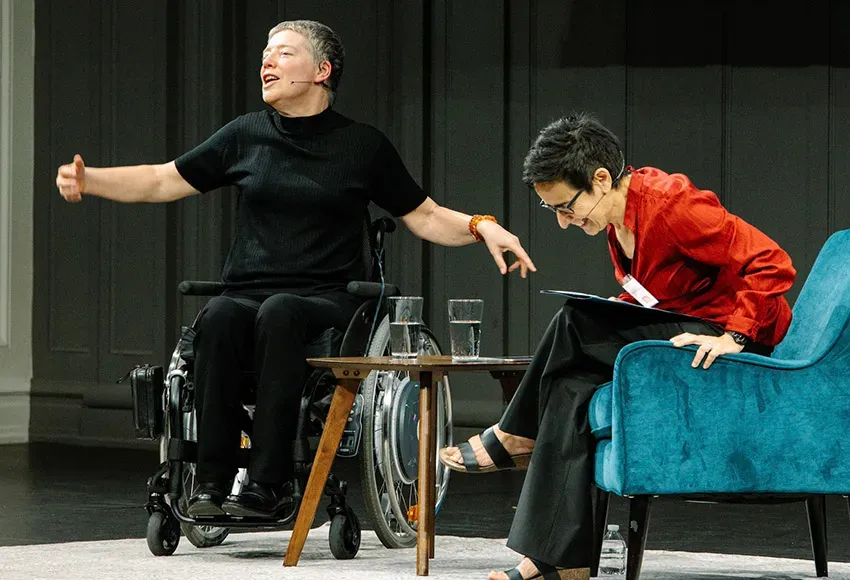A celebratory crowd of five hundred readers, scholars, and fans filled Town Hall on June 11 to hear local novelist and best seller Nicola Griffith talk about her medieval trilogy: Hild, Menewood, and Spear. She gave an eye-opening lecture about Queer women in early medieval Britain that asked questions about female sexuality and agency in a world dominated by male power. Judging by the close attention of the crowd, punctuated by laughter and applause, the audience found Griffith's insights clever, funny, and grounded in historical facts.
Women in sixth-century Britain had very little power or freedom of movement and almost no voice. They are also largely absent from surviving historical documents and legends. Griffith was fascinated by this absence and described how she searched through the libraries of England and continental Europe for evidence that women had more power than we realized – as well as more Queer "follies" (sex! good times!) than historians might have imagined. Her research discoveries – found more in anecdotes and songs than in the master narratives of history – led to her first novel, Hild, about Saint Hilda of Whitby (c. 614–680).
Hild celebrates the life of a woman who was famous in her day for her wisdom, energy, and independence of thought. Griffith said that her goal in writing about her was to show that the usual stories about kings and knights left out half the population of that era. By finding evidence of powerful women who were strong in their own right, Griffith also located clues that answered the question of whether Queer women existed and thrived in medieval England. Anecdotal sources, such as songs and jokes, proved that such possibilities existed.
In the accounts of the historian Bede, who was born in Hild's lifetime, Griffith discovered that Hild as a wise woman respected by the powerful men of her day. And as the abbess of a community of women, she was someone who might plausibly have found Queer sexuality familiar or even normal.
Griffith, who characterizes herself as a "Queer cripple with a PhD," presented her talk from a wheelchair on stage. She took the listeners through a discussion of why her novels preserve the ancient names of people and places despite a somewhat steep learning curve for readers. By using place names and key words as they occurred in Old Irish and Old English (for instance, "Cian" pronounced KEE-an; "scop" pronounced SHOW-p) she creates the same authenticity in language as she uses to represent the power and sexuality of early medieval women.
After her talk, Griffith answered a lively series of questions posed by María Bullón Fernández, a scholar of medieval literature at Seattle University and a member of the board of Humanities Washington, which sponsored the event. Griffiths also answered questions from the audience – though the last ("Was Hild a top?") brought the house down and ended the event on a hilarious note.
The presentation was followed by a book-signing session in the Town Hall lobby hosted by Charlie's Queer Books (463 36th Street). A long line of loyal fans and new kept Griffith signing all six of her books for an hour.
Find out more at https://nicolagriffith.com


